Agrotechnology faculty
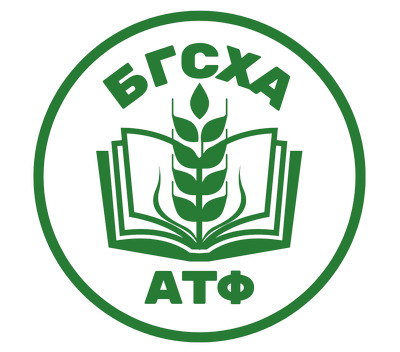
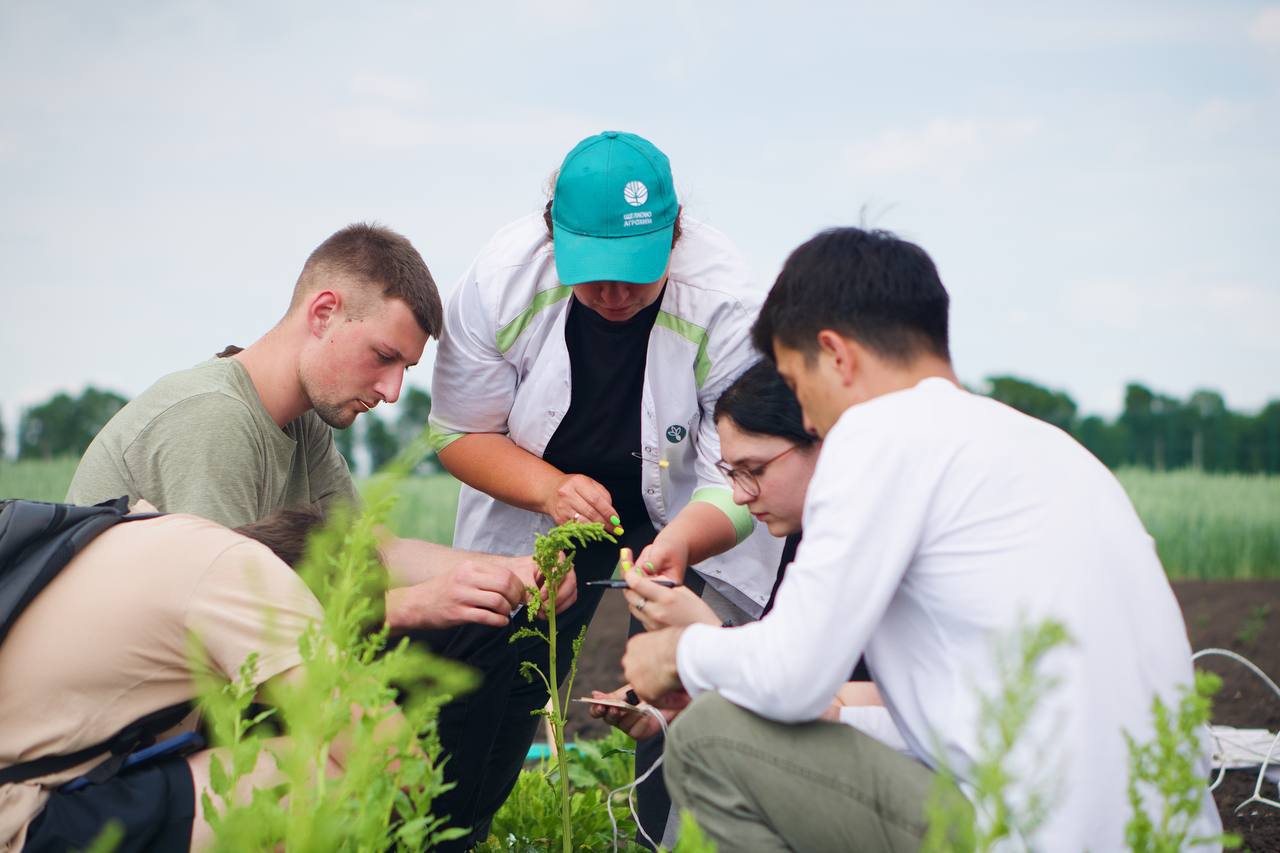 It was created in 1919. At this faculty, specialists are trained in the specialty (internal and extramural education) “agronomy” (including a shortened period of study), as well as “selection and seed production”.
It was created in 1919. At this faculty, specialists are trained in the specialty (internal and extramural education) “agronomy” (including a shortened period of study), as well as “selection and seed production”.
The Agrotechnology faculty of the Belarusian State Agricultural Academy is one of the oldest and the largest one at present.
Currently, the faculty has more than 560 full-time students. There are 8 departments, which employ 96 highly qualified specialists, including 9 doctors, professors; 76 candidates of sciences, associate professors.
At the Faculty of Agrotechnology, students are trained in the specialties "Production of plant products" and "Plant protection and quarantine" with the qualification of "technologist." The technologist solves the problem of improving crop cultivation technologies, and increasing the efficiency of land use. "Production of plant products" is the multidisciplinary specialty of agricultural education, covering the entire range of scientific knowledge in the sphere of growing agricultural, medicinal and ornamental plants.
The specialty "Plant Protection and Quarantine" provides training for specialists who understand the means and methods of plant protection, and are aware of the role of quarantine in stabilizing the phytosanitary situation and their role in creating a healthy living environment for humans. Today, these specialties are included in the list of the most popular in our country.
The Faculty of Agrotechnology is rightfully proud of its graduates. Among them there are the Chairman of the Supreme Council of the BSSR V.E. Lobanok; Deputy Prime Minister of the Republic of Belarus M.I. Rusy; Deputy Chairman of the Council of the Republic L.K. Zayats, academicians S.G. Skoropanov, P.I. Alsmik, V.P. Samsonov, V.N. Shlapunov, L.V. Kukresh and others; General Director of the National Research and Development Center for Agriculture of the National Academy of Sciences of Belarus F.I. Privalov; heads of agricultural enterprises, heads of district executive committees and agrarian departments of the country, deputies of the Belarusian parliament.
The Hero of Socialist Labour, Professor N.D. Mukhin, as well as academicians L.V. Khotyleva, S.I. Grib, corresponding members of the National Academy of Sciences G.I. Taranukho, A.V. Kilchevsky, doctors of sciences M.A. Kadyrov, N.P. Lukashevich, I.K. Koptik, S.A. Bonadyseva, I.A. Gordey and many others can be noted Among the outstanding breeders.
Biotechnology and Aquaculture Faculty
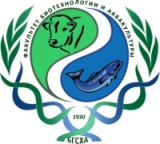
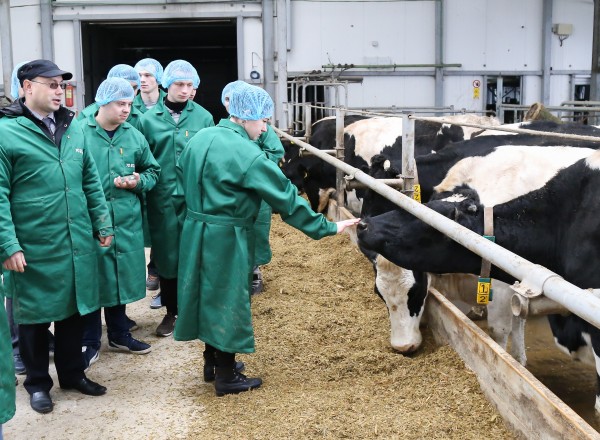 In 1930, a zooengineering faculty was formed, which received its present name in 2015: the Faculty of Biotechnology and Aquaculture. During the period of the faculty existence more than 8 thousand highly qualified specialists were trained. During this period, the faculty has made a significant contribution to providing agricultural enterprises of the Republic of Belarus with highly qualified specialists.
In 1930, a zooengineering faculty was formed, which received its present name in 2015: the Faculty of Biotechnology and Aquaculture. During the period of the faculty existence more than 8 thousand highly qualified specialists were trained. During this period, the faculty has made a significant contribution to providing agricultural enterprises of the Republic of Belarus with highly qualified specialists.
The faculty is training specialists in the specialty (internal and extramural education) "zooengineering" (including a shortened period of study), "industrial fish farming". On a full-time basis, specialists are being trained in the specialization "poultry farming".
More than 40 teachers, including 6 doctors of science, professors and about 30 candidates of science, associate professors, conduct training of students at 6 departments. There is a modern laboratory for applied endocrinology, veterinary medicine and biotechnology, inter-faculty genetic laboratory, laboratory for monitoring milk quality, training apiary, training computer laboratories, poultry laboratory, aquarium, microbiological laboratory, laboratory of zoohygiene.
Graduates of the specialty “industrial fish farming” can not only work in fish farms of the republic, but also be engaged in scientific research aimed at finding new fish culture objects and increasing the fish productivity of ponds. They can also study the protection of fish resources, work in reserves, national parks, committees on ecology and the protection of flora and fauna and other institutions.
Graduates of the zooengineering specialty work as managers and specialists at large agricultural enterprises, in breeding and hybrid centers and pig breeding complexes, breeding factories, republican pedigree enterprises, district pedigree stations, poultry farms, zoos, nature reserves, canine centers, district and regional services, scientific research and educational institutions.
Agricultural Mechanization Faculty
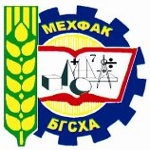
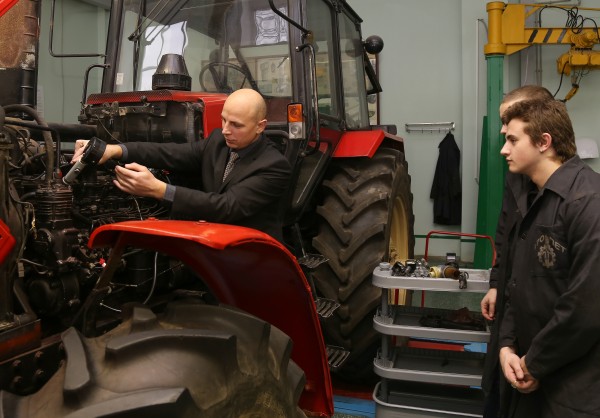 The Faculty of Agricultural Mechanization was founded in 1947. Currently, the faculty conducts training of specialists with higher education in three specialties of the first stage of higher education, such as: "Technical support of agricultural production processes" (full-time and part-time education), "Technical support of agricultural production processes" (reduced duration of training, full-time and part-time education), "Technical support of land reclamation and water management works" (full-time education). At the second stage of higher education, training is carried out in the specialty “Technical support of agricultural production processes” (full-time and part-time education) with the qualification assignment of a Master of Technical Sciences.
The Faculty of Agricultural Mechanization was founded in 1947. Currently, the faculty conducts training of specialists with higher education in three specialties of the first stage of higher education, such as: "Technical support of agricultural production processes" (full-time and part-time education), "Technical support of agricultural production processes" (reduced duration of training, full-time and part-time education), "Technical support of land reclamation and water management works" (full-time education). At the second stage of higher education, training is carried out in the specialty “Technical support of agricultural production processes” (full-time and part-time education) with the qualification assignment of a Master of Technical Sciences.
The faculty includes six departments equipped with modern equipment, a training ground, an industrial training workshop and a diagnostic car station. The faculty has a highly qualified teaching staff with 8 doctors of science, professors, and 39 candidates of science. The faculty has 788 students.
Special attention at the faculty is paid to in-depth, practice-oriented training of specialists. Students do internships at an industrial training workshop and at a training ground, at machine-building, repair and agricultural enterprises. Working in mechanized units, students of the faculty get prizes in regional, national and international competitions.
Graduates of the faculty are distributed to work in agricultural organizations, technical service organizations, research institutes, design organizations, machine testing stations.
Land Management Faculty

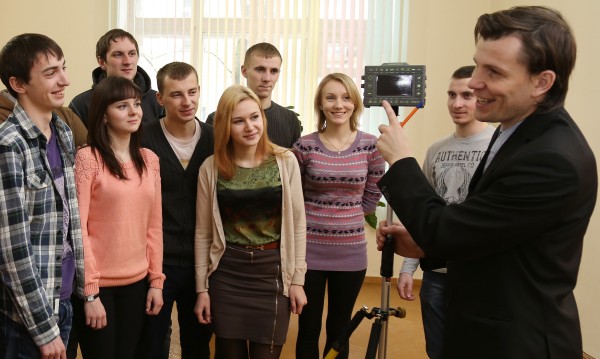 The Land Management Faculty is a unique faculty in the Republic of Belarus, which is a center for training highly qualified personnel for the state land management and cartographic-geodetic services of the country. The faculty was formed in 1924, but its history began with the opening in 1859 of land taxation classes at the Gory-Gorki agricultural school.
The Land Management Faculty is a unique faculty in the Republic of Belarus, which is a center for training highly qualified personnel for the state land management and cartographic-geodetic services of the country. The faculty was formed in 1924, but its history began with the opening in 1859 of land taxation classes at the Gory-Gorki agricultural school.
The faculty is proud of its graduates. Among the outstanding graduates of the land management department there are professors P.A. Atrushkevich, P.V. Kovel, V.F. Kolmykov, F.K. Kuropatenko, A.A. Solomonov, honorary doctor of the Academy G.I. Kuznetsov, deputy chairman of the State Committee on property of the Republic of Belarus A.V. Litreev, general director of the RUE "Design Institute Belgiprozem" V.V. Shalypin and many others.
At the land management faculty, specialists with higher education are trained in two specialties of the first stage and one specialty of the second stage of higher education. At the first stage of higher education, the preparation is carried out in the specialties “Land Management” and “Land Cadastre” (full-time education). At the second stage of higher education ̶ in the specialty "Land management, cadastre and monitoring of land" (full-time and part-time education).
The faculty consists of three departments, which employ highly qualified specialists. The departments are equipped with modern equipment, there are four modern computer classes, an educational and methodical study, and an educational and geodetic training ground "Gorki".
Students of the faculty consolidate theoretical knowledge and acquire practical skills at the Gorki training and geodetic range, in enterprises subordinated to the State Property Committee of the Republic of Belarus, land management services, regional and Minsk city agencies for state registration and land cadastre, their branches and bureaus.
Graduates of the faculty are distributed to organizations subordinate to the State Committee on Property of the Republic of Belarus, regional and city agencies for state registration and land cadastre.
Amelioration and Construction Faculty
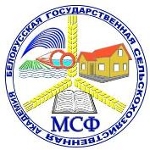
 The amelioration and construction faculty is one of the oldest in the academy, which was founded in 1919. The faculty has a rich history and good traditions, becoming the first in Belarus to train highly qualified specialists of land reclamation.
The amelioration and construction faculty is one of the oldest in the academy, which was founded in 1919. The faculty has a rich history and good traditions, becoming the first in Belarus to train highly qualified specialists of land reclamation.
The faculty is proud of its graduates. Among them are A.V. Aleksankin, First Deputy Minister of Land Reclamation and Water Management of the USSR, A.P. Basyukevich, Minister of Land Reclamation and Water Management of the BSSR, also corresponding members of the National Academy of Sciences of Belarus, honored scientists, professors, leaders of regional associations and many others.
The faculty conducts training in the following specialties: “Land Reclamation and Water Management” (full-time and part-time education), “Land Reclamation and Water Management” (shortened period of study, full-time education), “Rural construction and land improvement” (full-time and part-time form of education), "Rural construction and landscaping" (reduced duration of study, full-time form of education). At the second stage of higher education, training is carried out in the specialty “Land improvement, restoration and protection of land (full-time and part-time forms of higher education).
The faculty includes three departments where highly qualified specialists work, there is a laboratory building equipped with modern equipment.
Practical training at the faculty is carried out on the Tushkovo experimental irrigation complex, equipped with modern sprinkling machines, on experimental reclamation systems, in the base organizations of Belvodkhoz, as well as outside the Republic of Belarus as part of international student construction teams.
Graduates of the faculty are assigned to work in design institutes, construction and operational organizations of the Ministry of Agriculture and Food of the Republic of Belarus.
Economics Faculty

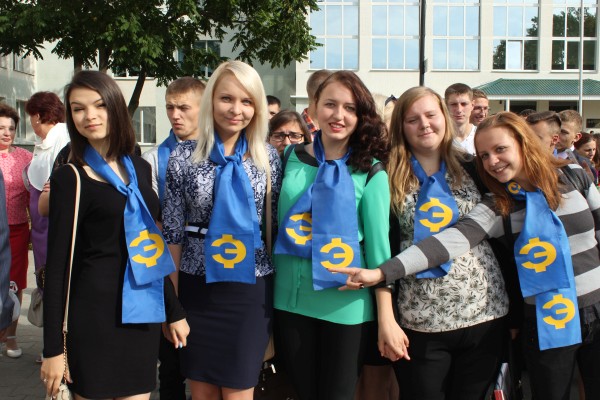 The Faculty of Economics at the I stage of higher education provides training in the field of “Economics and production organization in the sectors of the agro-industrial complex” (qualification ‘’economist-organizer’’), full-time, part-time, including shortened forms of education; “World economy” (qualification ‘’economist’’), full-time education, at the second stage ̶ “Economics and management of the national economy”. The faculty has a council for the protection of master’s theses; highly qualified personnel are trained through postgraduate and doctoral studies.
The Faculty of Economics at the I stage of higher education provides training in the field of “Economics and production organization in the sectors of the agro-industrial complex” (qualification ‘’economist-organizer’’), full-time, part-time, including shortened forms of education; “World economy” (qualification ‘’economist’’), full-time education, at the second stage ̶ “Economics and management of the national economy”. The faculty has a council for the protection of master’s theses; highly qualified personnel are trained through postgraduate and doctoral studies.
Graduates of the faculty successfully work in various branches of the agroindustrial complex of the Republic of Belarus, countries of near and far abroad. Many of them became prominent statesmen, scientists, heads of large institutions and enterprises. We are rightly proud of the fact that the first President of the Republic of Belarus, A.G. Lukashenko is a graduate of the Faculty of Economics. Among the well-known graduates are the Extraordinary and Plenipotentiary Ambassadors of the Republic of Belarus V.V. Grigoriev, L.V. Pakush, O.M. Tabanyuhov; Deputy Head of the Administration of the President of the Republic of Belarus N.G. Snopkov; Chairman of the Presidium of the National Academy of Sciences of Belarus, Doctor of Economics, Professor, Honored Scientist, Academician of the National Academy of Sciences of Belarus V.G. Gusakov; Rector of Polessky State University, Doctor of Economics, Professor K.K. Shebeko and many others.
The teaching staff of the faculty is represented by highly qualified specialists with extensive experience in teaching, research and practical work. At 5 departments there are 8 doctors of sciences, professors, 24 candidates of sciences, assistant professors. The chairs are equipped with modern computer equipment with the necessary software.
The Faculty of Economics offers a full range of services in economic education. The established traditions, the structure of training, the faculty and the modern material and technical base make it possible to prepare competent, qualified specialists who meet the requirements of international standards.
Accounting Faculty
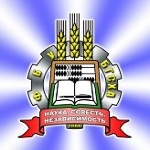
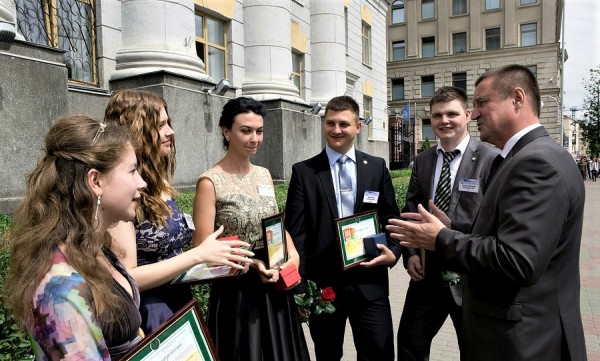 The Faculty of Accounting at the first level of higher education provides training in the field of "Accounting, analysis and audit" (qualification ‘’economist’’), "Finance and credit" (qualification ‘’economist’’), full-time, correspondence, including shortened education courses, at stage II ̶ in the specialty "Accounting, Statistics".
The Faculty of Accounting at the first level of higher education provides training in the field of "Accounting, analysis and audit" (qualification ‘’economist’’), "Finance and credit" (qualification ‘’economist’’), full-time, correspondence, including shortened education courses, at stage II ̶ in the specialty "Accounting, Statistics".
6 doctors of science, professors, 16 candidates of science, associate professors take part in the training of specialists in the accounting and financial profile. In solving accounting and analytical problems, students master the latest technologies, reference and analytical systems and specialized software for automating accounting (1C Accounting, Bukhstat, BUSINESS INFO, Best, etc.).
For practical training, students are sent to the leading enterprises of the AIC system, financial institutions and the banking sector. This enables graduates to understand the specifics of their professional activity, to test their competitiveness in the labor market and the possibilities of future employment. Students who are fluent in foreign languages have the opportunity to do internships abroad.
Professional qualifications allow graduates to work as accountants, economists and specialists at agro-industrial enterprises of all forms of ownership; in state control, financial and tax authorities; banks, inspectorates of the Ministry of Taxation, Social Security Fund; insurance companies; ministries and departments.
The faculty professes the principle of the international association of accountants "Science, conscience, independence" and is promising for talented, energetic and ambitious graduates of schools and colleges.
Business and Law Faculty
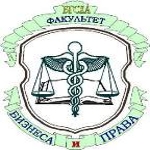
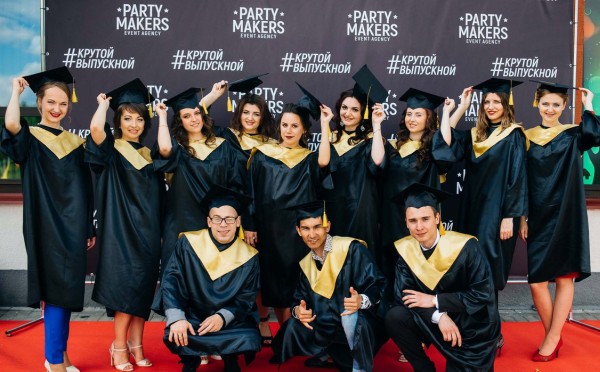 The Faculty of Business and Law is currently the only one in the republic that trains lawyers, marketing specialists and commercial specialists for the agro-industrial complex. Training at the I stage of higher education is carried out in the following specialties: “Jurisprudence” (qualification of a lawyer), full-time and part-time forms of education; “Commercial activity” (qualification of an economist), “Marketing” (qualification of a marketer-economist), full-time and part-time reduced forms of education, at the second stage ̶ in the specialty “Management in social and economic systems”.
The Faculty of Business and Law is currently the only one in the republic that trains lawyers, marketing specialists and commercial specialists for the agro-industrial complex. Training at the I stage of higher education is carried out in the following specialties: “Jurisprudence” (qualification of a lawyer), full-time and part-time forms of education; “Commercial activity” (qualification of an economist), “Marketing” (qualification of a marketer-economist), full-time and part-time reduced forms of education, at the second stage ̶ in the specialty “Management in social and economic systems”.
The faculty has a modern material and technical base. There are five educational laboratories, computer labs, a business lab, laboratories of merchandising, organization of trade and commercial equipment; of marketing research and forensics. At 4 departments there are 4 doctors of science, professors, 21 candidates of science, associate professors. Extensive business contacts have been established with a number of countries of the near and far abroad under programs of academic mobility and scientific cooperation.
Graduates of the specialties “Commercial activity” and “Marketing” are the economists of the new generation, possessing knowledge of production technologies in agriculture and processing industry, who are able to substantiate a rational production program, to stimulate the effectiveness of its implementation and product promotion. They successfully work as economists, marketers, logistics and sales economists, as well as merchandise specialists, sales agents, brokers, etc. Lawyers are familiar with the basics of economics, auditing, judicial accounting and accounting in the agro-industrial complex, they are familiar with the regulation of labor relations, foreign economic activity, civil and business processes, etc. On the labor market, they are in demand in legal services and departments of enterprises and organizations of the agro-industrial complex, in organs of the executive and judicial authorities, institutions of justice, education and science.
Students of 3-6 years of full-time or part-time courses with good academic performance (not less than 7 points), as well as persons with higher education, can receive additional higher education in the specialties of economic profile (“Economics and production organization in the branches of the AIC”, ‘’Accounting, analysis and audit ”, “ Finance and credit ”, “ Commercial activity ”, “ Marketing ”) at the Graduate School of Agribusiness.












